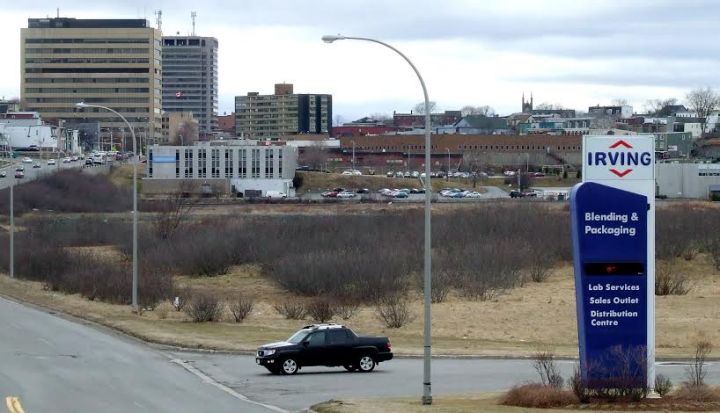
Editor’s note: This is the second story in a three-part series investigating the Irving corporate presence in Maine and New Brunswick and its implications for the state’s future.
SAINT JOHN, NEW BRUNSWICK — If you cruise down the superhighway that crosses this Portland-sized industrial city, you will see Irving everywhere.
That big building rising up in the city center: home office for J.D. Irving’s 15,000 employees.
 Go off the highway to grab a coffee at an Irving Oil gas station on Fairville Boulevard and across the street is Kent Building Supplies, a J.D. Irving company with 42 outlets employing 2,800 people in the Maritimes.
Go off the highway to grab a coffee at an Irving Oil gas station on Fairville Boulevard and across the street is Kent Building Supplies, a J.D. Irving company with 42 outlets employing 2,800 people in the Maritimes.
Drive a few streets away to look at the picturesque Reversing Falls. Across the tidal rapid is a huge J.D. Irving paper mill.
Head into the historic downtown — known as Uptown — and you’ll pass the offices of Saint John’s daily Telegraph-Journal, flagship of the Irving family’s 20 newspapers in the province, including three daily papers. One French-language daily and seven weekly papers in the province are owned by others.
Those two tankers in Courtenay Bay? Irving Oil. That mammoth refinery not far away with 150 oil tanks. Of course, Irving Oil.
Just outside the city, directly on the Bay of Fundy, is Irving Oil’s supertanker terminal, Canaport, which takes in 100 million barrels a year. Canaport also contains Irving’s liquefied natural gas (LNG) tanker terminal, a joint venture with Repsol, a Spanish company.
If you travel through the rest of the province, you can’t fail to see many of the 1.8 million acres of J.D. Irving forest with their crops of even-aged trees, as well as many of the 2.6 million acres of public or “crown” land the company harvests for its three New Brunswick paper mills and eight sawmills.
Several books and a Canadian-government report have noted that this power over a province by one family is probably unparalleled in the developed world.
“Welcome to an oligarchy,” quipped Gordon Dalzell, greeting a visitor to Saint John. He has spent years 15 years struggling with the Irving companies – successfully — to make the city’s air cleaner as a leader of the city’s Citizens Coalition for Clean Air. The refinery, he said, used to smell “like a match burning.”
In Maine, so far, only Aroostook County comes close to seeing this kind of Irving presence.
“They own the northern part of the state,” said Shelly Mountain, of Presque Isle, referring to J.D. Irving’s influence on the forest economy there. An environmental activist, she’s married to a logger.
But as described in Part 1 of this series, J.D Irving’s recent aggressive lobbying of Maine state government on forestry and mining issues and Irving Oil’s domination of Maine’s wholesale petroleum-products market could suggest the beginnings of a New-Brunswick-like future for the state.
What would that mean? New Brunswick’s Irving critics first point out that Irving domination has not made the province prosperous.
In terms of family income, it’s Canada’s poorest province, according to the federal agency Statistics Canada, which recently reported that New Brunswick’s population of 750,000 is continuing to shrink, attributing the decrease to a lack of jobs. J.D. Irving’s sleek headquarters in Saint John is surrounded by neighborhoods with unpainted houses and crumbling sidewalks.
Whatever the reasons for New Brunswick’s persistent poverty, the undisclosed profits made by the Irving family and its corporations haven’t resulted in a lot of tax receipts to support public services.
That’s because, as several books have documented, the profits generally haven’t stayed in New Brunswick nor even in Canada, but instead have landed in family trusts set up years ago in Bermuda, which has no corporate income tax.
The Bermuda trusts and the Irving empire were largely assembled by the hard-charging business acumen of K.C. Irving, the larger-than-life patriarch who died in 1992. He established the Irving corporate practices that are followed closely to this day.
A central practice is “vertical integration,” when the supply chain is owned wholly or partly by a business, creating tight control over the flow of raw materials, products and prices.
Vertical integration in J.D. Irving’s Maine businesses, for example, means that the company owns woodlands, employs woodcutters and has railroads to transport wood to mills, where the wood is turned into pulp and paper or lumber.
READ THE ENTIRE ARTICLE AT: https://pinetreewatch.org/new-brunswick-irving-company-province/
PART 1 IN THE SERIES : https://pinetreewatch.org/irving-lost-mining-battle-but-history-says-canadian-corporate-giant-will-not-give-up/


